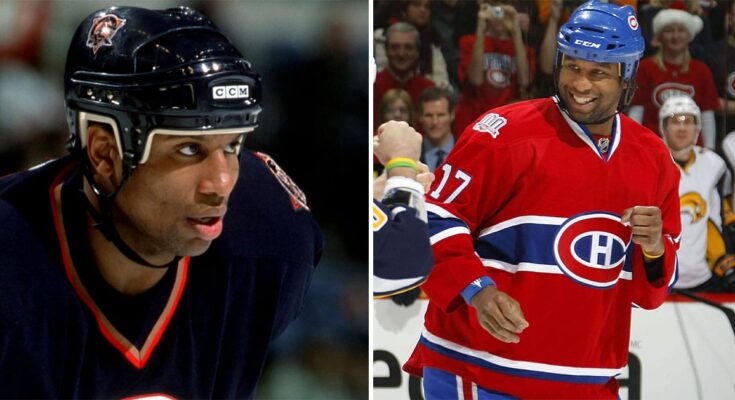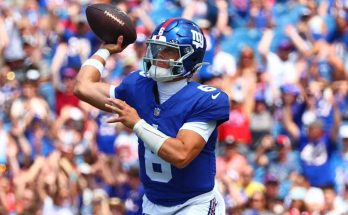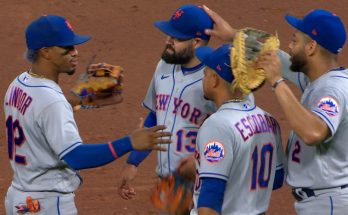George Laraque was a unique kind of enforcer—one who could dominate with brute strength on the ice and then win hearts with his infectious smile off it. At 6-foot-3 and more than 250 pounds, he was a force to be reckoned with physically, yet his personality was just as powerful in the most unexpected, endearing ways.
George Laraque was a unique kind of enforcer—one who could dominate with brute strength on the ice and then win hearts with his infectious smile off it. At 6-foot-3 and more than 250 pounds, he was a force to be reckoned with physically, yet his personality was just as powerful in the most unexpected, endearing ways. In a role often defined by intimidation, scowls, and sheer menace, Laraque stood out for his humanity. He was one of the toughest players the NHL had ever seen, but he never let toughness overshadow who he was: a thoughtful, kind, deeply principled man with a rare ability to balance ferocity and compassion.
Born in Montreal to Haitian immigrant parents, Laraque’s path to hockey wasn’t a conventional one. Ice hockey was, and in many ways still is, a sport overwhelmingly dominated by white players. But Laraque didn’t just break into the game—he bulldozed his way into it, carving out a name for himself in a system that wasn’t always welcoming. From a young age, he understood that to succeed, he would have to be twice as strong, twice as resilient, and unflinchingly determined. And that’s exactly what he was.
He played junior hockey with the Granby Bisons and helped lead the team to a Memorial Cup victory in 1996. His performance caught the attention of NHL scouts, and he was selected by the Edmonton Oilers in the second round of the 1995 NHL Entry Draft. When he finally made it to the NHL, Laraque embraced his role as an enforcer, knowing it was the most direct route to earning his place on the roster. He didn’t just fill that role—he redefined it.
Laraque wasn’t just a fighter. He was the fighter. During his time in the league, he was widely regarded as the most feared enforcer in the NHL. When he dropped the gloves, it wasn’t just a scuffle—it was an event. Fans would rise from their seats, players would brace themselves, and opponents would think twice. But what made Laraque different was his code. He wasn’t a goon looking to start trouble; he fought with purpose. He would often ask his opponent if they wanted to go before throwing a single punch. He respected the code of the enforcer—never hit a guy when he’s down, never fight out of anger, and always protect your teammates. In a role built on violence, Laraque injected integrity.
He played the majority of his NHL career with the Edmonton Oilers, becoming a fan favorite in the city. Despite being tasked with one of the most brutal jobs in professional sports, Laraque was beloved for more than his fists. He was engaging with the community, always approachable, always smiling. He understood his influence and used it for good, making regular appearances at schools, charity events, and local initiatives. Kids looked up to him not just because he was a hockey player, but because he made them feel seen.
On the ice, he did his job with unmatched effectiveness. He racked up over 1,100 penalty minutes in his career, squaring off against the toughest names in the game—Bob Probert, Tie Domi, Donald Brashear, Derek Boogaard, and many others. Yet he also had the skills to play the game. While he wasn’t known for his goal scoring, Laraque had surprisingly good hands for a man whose primary responsibility was to fight. He could control the puck in the corners, set up plays, and use his size to create space for linemates. When he was on the ice, opponents had to be alert—not just because of the threat of a fight, but because Laraque could actually play.
Perhaps the pinnacle of his career came during the Oilers’ magical run to the Stanley Cup Final in 2006. Laraque played a key role in that playoff campaign, not just with his physicality but with the energy and spirit he brought to the locker room. While the Oilers ultimately fell short in a heartbreaking Game 7 loss to the Carolina Hurricanes, the run cemented Laraque’s legacy in Edmonton. He wasn’t just a player; he was a symbol of the team’s heart and grit.
After his time in Edmonton, Laraque would go on to play for the Phoenix Coyotes, Pittsburgh Penguins, and Montreal Canadiens. His signing with the Canadiens in 2008 was particularly significant. It marked a homecoming, as Laraque had grown up idolizing the Habs. The city welcomed him back with open arms, and although his time there was limited due to injuries and the physical toll of years of fighting, it was a deeply meaningful chapter in his career. Playing for Montreal wasn’t just about hockey—it was about family, heritage, and pride.
But even as Laraque’s time on the ice wound down, his influence only grew. Retirement didn’t slow him down—it gave him a new platform. He became a radio host, author, politician, and activist. His autobiography, Georges Laraque: The Story of the NHL’s Unlikeliest Tough Guy, gave fans an inside look into the life of a man who had seen the best and worst of professional hockey. He didn’t hold back, speaking openly about racism in the sport, the psychological toll of fighting, and his own struggles.
He also became a passionate advocate for environmental causes and animal rights. In a move that surprised many, Laraque became a vegan—an unusual lifestyle for a man once defined by brute strength. But that’s what made him so compelling: he defied stereotypes. He proved that you could be tough and compassionate, fierce and gentle. He spoke out against animal cruelty, supported green energy initiatives, and used his fame to bring attention to causes that mattered deeply to him.
His activism extended into the political realm as well. In 2010, he became deputy leader of the Green Party of Canada, further proving that his ambitions went far beyond sports. Laraque was never content to be known for just one thing. His mind was just as strong as his fists, and his commitment to making the world better was as intense as his drive to protect teammates on the ice.
What continues to make George Laraque remarkable is how he bridged worlds that rarely intersect. In a game often defined by its rigid roles, Laraque was a walking contradiction in the best way possible. He was the fighter who asked before throwing punches. The enforcer who read philosophy. The hockey player who stood up against racism, animal cruelty, and environmental degradation. He was a man of strength and sensitivity, who never let one side of his identity cancel out the other.
He remains active in charity work, youth mentoring, and public speaking. Whether visiting schools, working with underprivileged communities, or speaking at universities, Laraque remains committed to using his platform to inspire change. He speaks frequently about perseverance, self-belief, and breaking barriers—not just in hockey, but in life.
For many fans, George Laraque will always be the ultimate paradox. He was a warrior, yes, but also a healer in a way few could understand. He showed that being an enforcer didn’t mean surrendering your soul. That kindness wasn’t a weakness, but a form of strength. That you could throw punches with honor and still hold compassion in your heart.
He wasn’t perfect—no enforcer ever is. He took hits, delivered them, and lived with the pain. He endured racism, injuries, public scrutiny, and the internal battles that come with being both protector and target. But through it all, he carried himself with dignity. He earned respect not just for what he did, but for how he did it.
George Laraque may have entered the NHL as a fighter, but he left it as something much more—a role model, a trailblazer, and a reminder that greatness doesn’t always come from scoring goals. Sometimes, it comes from standing up, both on the ice and off, and refusing to be anyone but your full, authentic self.


